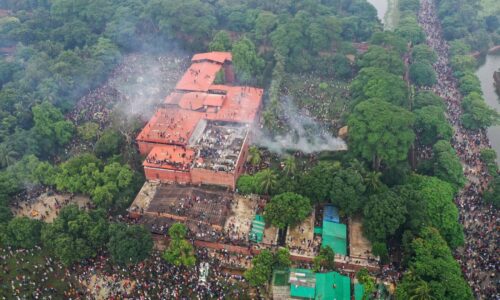AFP | Reuters:”Bangladesh’s president dissolved parliament on Tuesday, paving the way for the formation of an interim government, a day after Prime Minister Sheikh Hasina resigned and fled the country following a violent crackdown on a student-led uprising.
A statement from President Mohammed Shahabuddin’s office also said that Hasina’s arch-rival, Bangladesh Nationalist Party (BNP) chairperson Begum Khaleda Zia, a former prime minister, had been freed from house arrest.
Student protesters had threatened more demonstrations if parliament was not dissolved.
The movement that toppled Hasina rose out of demonstrations against public sector job quotas for families of veterans of Bangladesh’s 1971 independence war, seen by critics as a means to reserve jobs for allies of the ruling party.
The unrest began last month in the form of protests against civil service job quotas and then escalated into wider calls for Hasina to stand down.
Hasina, 76, had been in power since 2009 but was accused of rigging elections in January and then watched millions of people take to the streets over the past month demanding she step down.
More than 400 people died as security forces sought to quell the unrest, but the protests grew and Hasina finally fled Bangladesh aboard a helicopter on Monday as the military turned against her.
The decision to dissolve parliament was taken following meetings with the heads of defence forces, leaders of political parties, student leaders and some civil society representatives, the presidential statement said.
President Shahabuddin had said earlier that an interim government would hold elections soon after it takes over. Army chief General Wakeruz Zaman was due to meet student leaders to discuss the formation of the government.
Nahid Islam, one of the key organisers of the movement against Hasina, said in a video on Facebook with two other student leaders that parliament should be dissolved by 3pm (9am GMT) on Tuesday and asked “revolutionary students to be ready” if that did not happen.
Hasina’s flight ended her 15-year second stint in power in the country of 170 million people, which she had ruled for 20 of the last 30 years at the helm of a political movement inherited from her father, state founder Mujibur Rahman, assassinated in 1975.




